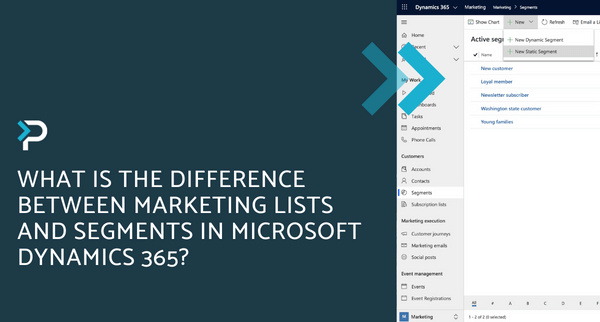How to plan for a Microsoft Dynamics 365 Implementation
How to plan for a Microsoft Dynamics 365 Implementation
June 10th, 2022
5 min read
Your organisation has selected Microsoft Dynamics 365 as the right solution to help your business succeed and the next step is to prepare your business and employees for the changes your implementation will bring. Your organisations readiness for implementation can have a huge effect on the success and smooth running of your Microsoft Dynamics 365 implementation, user adoption, and overall success of the project. But what does implementation readiness look like and how do you prepare your business for this change?
We have put together a set of steps to ensure that your business is ready for an upcoming Microsoft Dynamics 365 implementation…
Steps to preparing for implementation and navigating change
1. Create a project team
You may already have a team in place that was responsible for selecting Microsoft Dynamics 365 and these employees may continue to contribute now you’re in the implementation phase. However, it is important to remember that your D365 implementation isn’t exclusive to your IT personnel or C-level executives, therefore, consider getting employees involved from across your organisation. For example, if your Dynamics 365 Solution will require input from departments such as finance, sales, customer service, marketing, etc, ensure that your project team includes representatives from these areas. These will be the best-placed people to flag any potential departmental challenges.
2. Provide clear and constant communication
From the project team, to management, to the wider employee body; communicating and making everyone feel like they are fully informed is essential. It is important that anyone who may experience a change in day-to-day processes, as a result of new technology, is communicated with. Ensuring that your team can identify and overcome any challenges that may arise will help to keep your project on track. Communicating to your wider audience whose role or daily tasks will be impacted by your D365 implementation is key. A clear communication plan will ensure employees receive information and messages regarding the changes as well as the opportunity for them to ask questions in a timely manner. Key communication to consider:
- Providing a preview of the solution
- Communication frequency and method
- Status reporting including feedback from the project team
- Go-Live and availability information
3. Create a change management strategy
Adoption and change management planning is essential and should be on-going throughout your implementation. Change isn’t easy and it is normal to experience some resistance within a business, therefore, creating a well-planned and structured approach will help with user adoption and overall acceptance. A change management strategy incorporating a clear action plan helps to ensure the project runs smoothly, aswell as aligning your stakeholders and end-user expectations. Providing and sticking to a clear plan incorporating milestones, deliverables, activities, resources, etc will help to support and guide your employees through the changes your Dynamics 365 implementation will bring. Answering the key questions below, provides a good foundation to formulating your change management plan:
- How much change management does your D365 implementation require?
- Which employees will be impacted by this initiative?
- How are individuals or departments impacted?
- Who are the employees that need to be involved to make your implementation a success?
4. Be prepared for resistance
Despite having a well-planned change management strategy, resistance is still to be expected. Highlighting the activities or areas of concern should be recognised early in your implementation project timeline. Appointing ‘User Champions’ within the business to help ensure your Dynamics 365 solution is user-centric, will significantly contribute towards minimising risk.
5. Conduct a current systems and tools health check
Performing an inventory and health check of your current software applications across your business to ensure they are up to date will help with their ease of integration with your new Microsoft Dynamics 365 solution.
6. Perform a data cleanse
Essentially, if your data isn’t in good shape then D365 cannot work to its full potential. Look at the quality of your data and identify what will be migrated over during implementation. Information that is out of date, not complete, duplicated or irrelevant needs to be eliminated or edited to ensure your data is as accurate as possible. Performing a data cleanse is often time-consuming and may require input from employees across your organisation but once reviewed, will support a smoother migration process during your implementation.
7. Understand Microsoft Dynamics 365’s capabilities
Prior to implementation we advise reflecting on what Dynamics 365 can do for your organisation and ensure that it aligns with your overall business goals. During this process, we recommend looking at the Microsoft suite to identify how you can incorporate more of the native features or products, to get the most from your technology. Your technology partner should be on hand to advise on any recommendations and work with you to identify other areas where Microsoft tools can be leveraged.
Why work with Pragmatiq?
As Microsoft Dynamics 365 experts, we understand the difference that working with a trusted partner can make to the overall success of your Dynamics 365 implementation and we pride ourselves on our unique and successful methodology, which takes you from the start of your D365 journey, through to implementation and beyond.
Additionally, we are a Microsoft Gold Partner, meaning we hold the highest certification available to Microsoft Partners and is only attained by a small percentage of partners globally. This demonstrates our commitment to delivering exceptional service as well as providing a skilled and experienced team of technical experts. Additionally, we believe that every project must start with the user and how technology can revolutionise their working processes and empower teams across all areas of your business.
Get in touch
If you want to find out more about Microsoft Dynamics 365 or how Pragmatiq might be able to support you through an implementation, please get in touch via the contact form, or email us at info@pragmatiq.co.uk / call us on 01908 038110.
Want to keep in touch?
Sign up to our newsletter for regular updates.
"*" indicates required fields


